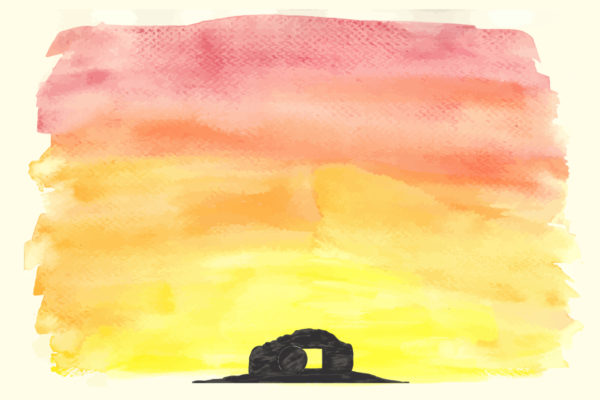1 Corinthians 15:20-22: “20 But in fact Christ has been raised from the dead, the firstfruits of those who have fallen asleep. 21 For as by a man came death, by a man has come also the resurrection of the dead. 22 For as in Adam all die, so also in Christ shall all be made alive.”
The first funeral I ever attended was my great grandma’s. She died at 103 years old. I was in 4th grade, and my parents let me take a whole week off school so we could fly to Hong Kong to pay our respects.
I remember walking into a looming grey building packed with people, all of whom looked like they were going to cry. The thick smell of incense filled the hallways. All around me other families burned paper houses and fake money because they believed it would give their dead a mansion and riches in heaven. As I stared at the ash heaps, I remember thinking, “I don’t think that’s going to do anything to help the dead person.”
We finally reached the room where my family surrounded my great grandma’s body, and I followed my parents as we approached a huge, black casket.
There she was, looking very peaceful. We stared for a moment in silence, but then I thought I saw something strange. So I tugged at my mom’s arm and whispered, “Mom, her chest is moving up and down! She’s still breathing! Is she just sleeping?”
And my mom took that moment to give me a little theology lesson. She said, “She does look like she’s sleeping, doesn’t she? Yes, she’s only sleeping, because your great grandma knows Jesus. One day, she will wake up again.”
And with that, my mom explained to me the significance of 1 Corinthians 15:20: “But in fact Christ has been raised from the dead, the firstfruits of those who have fallen asleep.”
Because Jesus rose from the dead, now Christians who die are just “those who have fallen asleep.” That’s a very beautiful way of saying that we Christians don’t need to fear death, because for us, death is just taking a nap. We’ll wake up again.
Jesus’s resurrection proves it. He woke up from death, so for Him, death is not the end. And if you believe in Him, death won’t be the end for you, either. Just a bit of a nap.
And that’s just the beginning of the spiritual blessings we find in 1 Corinthians 15. In these verses, we find no less than four reasons we Christians celebrate Jesus’s resurrection.
The first reason we celebrate is because Jesus has reversed death. As verse 22 reminds us, “For as in Adam all die, so also in Christ shall all be made alive.”
The first half of this verse we know all too well. In Adam, we all die. We may act like we’ve forgotten this, but all of us will certainly die. That’s how it’s been since Adam sinned against God. And we’ve all engaged in his same rebellion deserving of death.
But that’s why Jesus came. He came to reverse that curse of death. He came to bring us back to God. All of us in Adam will die, but all of us in Jesus will be made alive. Because Jesus reversed the curse of death with His resurrection. So for us who believe in Him, death is but a lengthy nap. One day, Jesus will wake us up again.
A second reason we celebrate Jesus’s resurrection is because it shows God’s plan is unstoppably victorious. Verse 23 says, “But each in his own order: Christ the firstfruits, then at his coming those who belong to Christ.”
That word, “order,” tells us that God has an order, or plan, to history that He’s unfolding even now. God has an order to how things are working out. In other words, God is saying, “Things are going according to plan.” What’s the plan?
The plan has two phases. In phase one, Jesus resurrects from the dead, which already happened that first Easter. So now we’re waiting for phase 2: All the Christians who have died will also be raised from the dead, just as Jesus was.
Since the first part of God’s plan has already happened, it guarantees the second part: All of us who believe in Jesus will be raised from the dead and live forever. Jesus is the “firstfruits,” and the rest of us believers are the full harvest to come.
So we can take heart, because Jesus’s resurrection shows us that God has a plan, and that plan is unstoppably victorious. That’s a big part of what keeps us stable when the world falls to chaos. God has a plan, and everything’s going according to His plan.
But where is that plan heading in the end? What can we expect after all is said and done? This leads us to our third reason we celebrate Jesus’ resurrection: He will end all evil. Verse 24 continues: “Then comes the end, when he delivers the kingdom of God the Father after destroying every rule and every authority and power. 25 For he must reign until he has put all his enemies under his feet. 26 The last enemy to be destroyed is death.”
In our broken world, more often than not it looks like evil is winning. But Jesus’ resurrection means that it won’t stay this way forever. Evil will not win in the end. In the end, every evil ruler will be brought down, every oppressive power will be removed, and even death itself will be destroyed.
And that’s amazing because right now, death is all around us. It’s in every country infected with COVID-19. It’s in every crowded hospital in which medical workers are scrambling to keep people breathing. And virus or not, death is even inside of us, in our aches and pains as our bodies break down.
But because of Jesus’s resurrection, “we do not lose heart. Though our outer self is wasting away, our inner self is being renewed day by day” (2 Cor 4:16). Our outward body may be dying. But our inward spirit is full of hope. Because Jesus resurrected from the dead, and that’s worth celebrating.
Even that’s not all. God won’t just end all things that are wrong; He will set all things right again. So a fourth reason we celebrate Jesus’ resurrection is because it promises that God will set all things right. Verse 27 says, “For ‘God has put all things in subjection under his feet.’ But when it says, ‘all things are put in subjection,’ it is plain that he is excepted who put all things in subjection under him. 28 When all things are subjected to him, then the Son himself will also be subjected to him who put all things in subjection under him, that God may be all in all.”
All that might sound confusing, but it’s just saying this: God will set everything back in its right order so that we will have eternal joy. Jesus will put God back in first place. That’s what verse 28 is saying: “the Son himself will also be subjected to him.” Jesus understands that we’ll only be happy when God is first place in our lives. So as our representative, Jesus will put God back in first place, setting all creation right again.
Now this doesn’t mean that Jesus is less than God. This means that Jesus is setting the example for us. Jesus, as the Perfect Man, as the one we should all be like, totally submits Himself to God’s will. Where we failed, Jesus succeeds. At the end of time, this is what Jesus will do: He will set everything back in its right place. And its right place means that God takes first place, with everything else under God.
And then verse 28 will come true: “so that God may be all in all.” You could translate it this way: “So that God may be everything to everyone.” God will be our everything. God will completely satisfy us. When He completely takes first place in our hearts.
Right now we don’t see that yet. We don’t yet see everything set right. We don’t yet see God in first place in our hearts. We’re not yet able to say completely, “The Lord is my Shepherd. I shall not want.”
But Jesus is accomplishing this, and it all started when He rose from the dead. That’s why we celebrate Jesus’ resurrection. We celebrate because He has reversed death, established God’s plan, proved that evil will come to an end, and begun to set everything right again.
Take some time to praise Him today. Set aside time for silent prayer to worship Him for all that He is to us as the Resurrected One. Gather with others (even virtually) and speak His praises. You can use these verses in 1 Corinthians 15 to guide the meditations of your heart.
May our resurrected Lord bless you richly with His hope and presence this Easter, so that in our hearts, our families, and our churches, “God may be all in all.”



